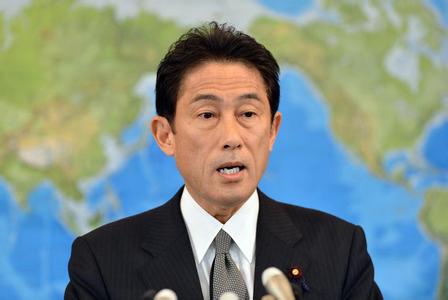By Zhou Yongsheng, deputy director of the center for Japanese Studies, professor and PH.D., supervisor of the Institute of International Relations in Foreign Affairs University
Japanese Foreign Minister Fumio Kishida ended his three-day visit to China on May 1, filled with achievements. Yet, he started his diplomatic trip to ASEAN (Association of Southeast Asian Nations) to restrain Beijing.

During his visit on April 30, Kishida had met with Chinese Foreign Minister Wang Yi, and was received by State Councilor Yang Jiechi, as well as Premier Li Keqiang, which had given him much praise from the public, at home and abroad.
Nevertheless, the Japanese Foreign Minister had just paid a visit to four nations of ASEAN to disrupt the region. Tokyo will take its turn to hold the China-Japan-South Korea summit meeting this year, and prepare in advance as a host country.
Kishida sought to explore whether it's likely to hold a trilateral meeting of foreign ministers before or after the G-7 summit to demonstrate Tokyo's diplomatic achievements in Northeast Asia. His move aims to garner voters' approval for the LDP (Liberal Democrat Party), Japan's ruling-party in the nation's Upper House election in July.
Whatever the Japanese political considerations are, it was the first formal visit for a sitting Japanese Foreign Minister in the past four and a half years. Beijing had extended a grand reception to promote bilateral relations.
Kishida also extended an invitation to Premier Li Keqiang to visit Japan. To promote the China-Japan-South Korea Foreign Ministers' Meeting would benefit all three countries. They hold a tremendous share of economic trade volume in the world.
However, the lack of an economic cooperation mechanism is a relative weakness for the three economic powers as compared to North America and the European Union.
Northeast Asian countries should recognize that no matter what the domestic political reasons are; to promote closer regional cooperation can strengthen the region. Kishida's visit to China had a positive impact on Sino-Japanese relations.
Kishida's warm visit to China demonstrates that Beijing and Tokyo should boost cross-border investment. As neighbors, China and Japan can not break away. There will be serious problems if the two countries continue to struggle against each other. They should commit to improving relations to share the benefits.
Kishida's speech in China was formulated in logic and facts. But Tokyo must strive to implement actions to match words with deeds, and let everyone see their sincerity.
Tokyo should have a sincere desire to cooperate with Beijing and Seoul. Only by doing so, Japan's diplomacy would yield twice the result with half the effort. Otherwise, confrontation and containment would yield the opposite results.
( The opinions expressed here do not necessarily reflect the opinions of Panview or CCTV.com. )

Panview offers an alternative angle on China and the rest of the world through the analyses and opinions of experts. We also welcome outside submissions, so feel free to send in your own editorials to "globalopinion@vip.cntv.cn" for consideration.















